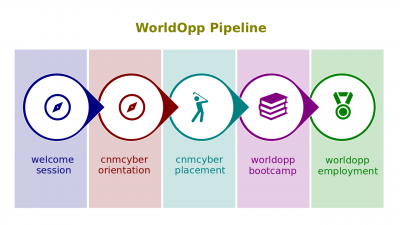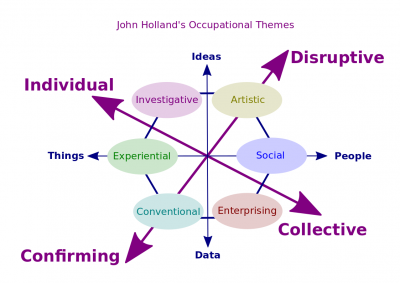Difference between revisions of "Personalities and Work"
m (Gary moved page Personalities in Trade to Personalities and Work without leaving a redirect) |
(→Script) |
||
| Line 22: | Line 22: | ||
===Script=== | ===Script=== | ||
| − | : | + | :Many [[psychologist]]s have studied the idea to match [[personality|personaliti]]es and [[occupation]]s. Logically, disruptive |
| + | |||
| + | |||
| + | |||
| + | are more disruptive, some are more conforming, some are more individual, some are more collective. American psychologist John Holland assumed that some [[occupation]]s require particular ''personalities'' and identified six categories that require specific ''personalities''. | ||
:Here are two different sets of dimensions, one is working ideas verses data and people verses things and clearly social works more with people and experiential or realistic work more with things. Ideas, we have artistic and investigative. So artistic basically create ideas and investigative find ideas or find what`s there behind the ideas and data. Enterprise and conventional, interestingly enterprising is not in ideas, enterprising is between people and data. It's more of persuasive, working with people and data. That's it for [[occupational theme]]s. Next we will look at conditions of work. | :Here are two different sets of dimensions, one is working ideas verses data and people verses things and clearly social works more with people and experiential or realistic work more with things. Ideas, we have artistic and investigative. So artistic basically create ideas and investigative find ideas or find what`s there behind the ideas and data. Enterprise and conventional, interestingly enterprising is not in ideas, enterprising is between people and data. It's more of persuasive, working with people and data. That's it for [[occupational theme]]s. Next we will look at conditions of work. | ||
Revision as of 22:57, 4 May 2020
Personalities and Work (hereinafter, the Lectio) is the second lesson part of the Nature of Occupations lesson that introduces its participants to occupations and related topics.
This lesson belongs to the Introduction to Employment session of the CNM Cyber Orientation. The Orientation is the second stage of the WorldOpp Pipeline.
Contents
Content
The predecessor lectio is What Occupation Is.
Key terms
- Personality. The unique combination of emotional, thought, and behavioral patterns that affect how a person reacts to situations and interacts with others.
- Big Five Model. A personality trait model that includes extraversion, agreeableness, conscientiousness, emotional stability, and openness to experience.
- Myers-Briggs Type Indicator (MBTI). A personality test that taps four characteristics and classifies people into one of 16 personality types. Every characteristic contributes one letter from the following pairs: Extraversion (E) or Intraversion (I) depending on onward or inward focus, Sensing (S) or Intuition (N) depending on preference in taking in information, Thinking (T) or Feeling (F) depending on preference in making decisions, Judging (J) or Perceiving (P) depending on preference in living outer life.
- Personality dimension.
- Emotional stability. A personality dimension that characterizes someone as calm, self-confident, and secure (positive) versus nervous, depressed, and insecure (negative).
- Openness to experience. A personality dimension that characterizes someone in terms of imagination, sensitivity, and curiosity.
- Agreeableness. A personality dimension that describes someone who is good natured, cooperative, and trusting.
- Conscientiousness. A personality dimension that describes someone who is responsible, dependable, persistent, and organized.
- Extraversion. A personality dimension describing someone who is sociable, gregarious, and assertive.
- Intraversion. The opposite of extraversion.
Script
- Many psychologists have studied the idea to match personalities and occupations. Logically, disruptive
are more disruptive, some are more conforming, some are more individual, some are more collective. American psychologist John Holland assumed that some occupations require particular personalities and identified six categories that require specific personalities.
- Here are two different sets of dimensions, one is working ideas verses data and people verses things and clearly social works more with people and experiential or realistic work more with things. Ideas, we have artistic and investigative. So artistic basically create ideas and investigative find ideas or find what`s there behind the ideas and data. Enterprise and conventional, interestingly enterprising is not in ideas, enterprising is between people and data. It's more of persuasive, working with people and data. That's it for occupational themes. Next we will look at conditions of work.
Occupational Themes is the successor lectio.

